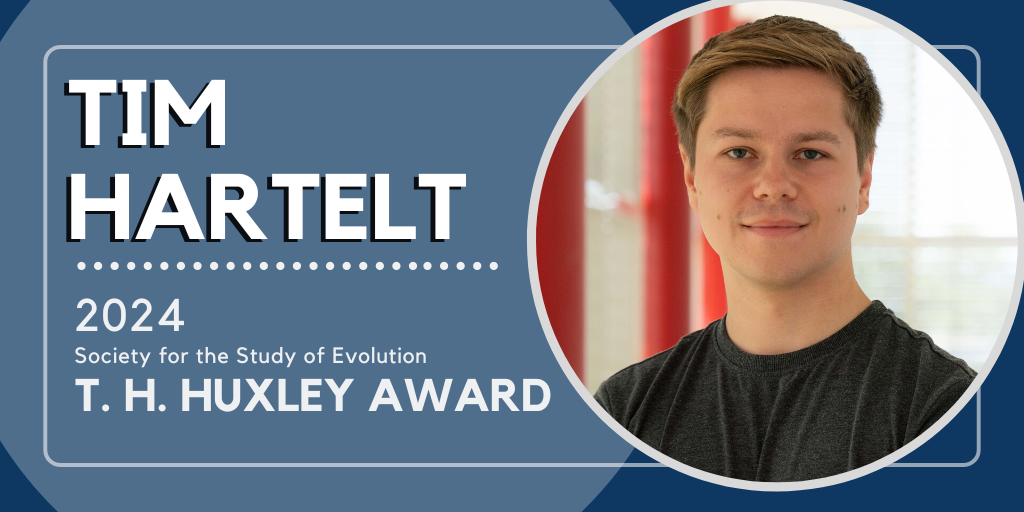
The SSE Huxley Award Committee is pleased to announce the winner of the 2024 T. H. Huxley Award, Tim Hartelt, PhD student advised by Dr. Helge Martens in the Department of Biology Education at the University of Kassel in Germany. Hartelt was selected for his educational resource, "Metaconceptual Learning Activities for Promoting Metacognitive Awareness and Self-Regulation of Intuitive Thinking in Evolution Education." In the activities, students actively engage with their intuitive thinking to develop an appropriate understanding of evolution. Learn more about the activity here, and read a recent paper by Hartelt and colleagues here. As part of the award, Hartelt will receive funding to present his work at the National Association of Biology Teachers (NABT) conference in November.
ABOUT | ELIGIBILITY | HOW TO APPLY | EVALUATION CRITERIA | AWARD | PREVIOUS RECIPIENTS
The SSE Education and Outreach Committee is pleased to announce the T. H. Huxley award, named in honor of Darwin's very public supporter T.H. Huxley, which recognizes and promotes the development of high quality evolution education resources. If you have an interesting project or educational activity to share, consider applying for this award. Graduate students and postdoctoral fellows are encouraged to apply. This award provides funding for an SSE member to present evolution education resources at an education-focused session or conference approved by the Huxley Committee (e.g., education session at the annual Evolution meeting or the annual National Association of Biology Teachers conference).
Examples of possible resources include classroom/museum activities, in-class or lab resources, podcasts, publications, websites, and videos. Competitive applications will be resources that include materials for student or audience engagement and assessment, not simply the presentation of information. All applications should include appropriate copyright and research permissions.
Applicants must be members of SSE. To join, visit https://payments.evolutionsociety.org/joinsse/.
To apply, please complete this form.
![]()
Deadline: February 1, 2024
Questions? Contact the Huxley Award Committee at huxleyaward@evolutionsociety.org.
The proposed project or resource must:
The following types of projects will not be considered:
Priority will be given to materials that have been tested in multiple settings.
The recipient will receive funding to present evolution education resources at an education-focused session or conference approved by the Huxley Committee (e.g., education session at the annual Evolution meeting or the annual National Association of Biology Teachers conference). Graduate student and postdoc awardees will receive a one-year membership as part of the award. A winner will be announced in early March.
Sarah Bordenstein
Discover the Microbes Within! The Wolbachia Project
Learn more about the project.
Not awarded.
Dr. John Jungck and Dr. Sam Donovan
Beagle Investigations Return with Darwinian Data (BIRDD) project
Learn more about the project.
Erin L. McCullough, Lauren Verdeflor and colleagues Alaina Weinsztok, Jason R. Wiles, and Steve Dorus
Syracuse University & KIPP NYC College Prep High School
Exploratory activities for understanding evolutionary relationships depicted by phylogenetic trees: united but diverse
Read the paper describing the activity.
Brinda Govindan
San Francisco University
Bacterial Survivor
Read the paper describing the activity here: https://evolution-outreach.springeropen.com/articles/10.1186/s12052-017-0074-2
Katie Grogan and colleagues Teresa W. Lee and Justine Liepkalns
Emory University
Making evolution stick: using sticky notes to teach the mechanisms of evolutionary change
Read the paper describing the activity here: https://evolution-outreach.springeropen.com/articles/10.1186/s12052-017-0074-2
Laura Bankers with Kyle McElroy, Joseph Jalinsky, James Woodell, Claire Adrian-Tucci, Katelyn Larkin, Robert Todd, Jorge Moreno, Dr. Emily Schoerning, and Dr. Maurine Neiman
National Center for Science Education Booster Clubs
Project website
Amanda Gibson and Ariel Marcy
Amanda Gibson, Evolution, Ecology and Behavior Department of Biology, Indiana University
Designed a hands-on game that requires students to collaborate to generate data and test predictions of the Red Queen Hypothesis.
Ariel Marcy - University of Queensland
Created Go Extinct! Players become zoologists competing to collect color –coded sets of closely related animal cards.
Dr. Phil Gibson
University of Oklahoma
How To Use Tree Thinking To Teach Plant Diversity and Evolution
Dr. Jonathan Atwell,
Indiana University
Say Hello to the Junco! Teaching Evolution, Behavior, Genetics, and the Scientific Process with a Common Backyard Bird!
Dr. William Ratcliff
Georgia Tech
Yeast Experiment Hints at a Faster Evolution From Single Cells
Information on the awarded work: [1] [2] [3]